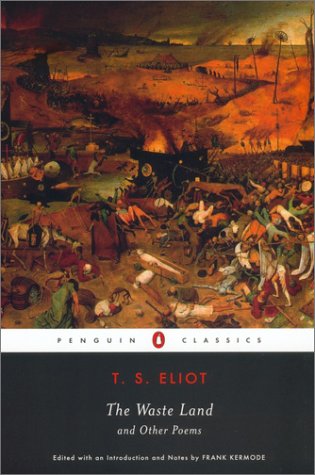Reading that isn't school-related.
Cicero, Eliot, or school work?
It's simply too difficult to make the decision.
Let me explain:
Thanks to a 7 and a 1/2-hour plane flight and to multiple evenings of downtime while in Dar Bouazza, I was able to complete much of my reading and work for this week ahead of time. This will all change tomorrow, of course, when I start a new week's worth of work (Wednesdays are like all you people who actually have jobs' Mondays). So yesterday before class I finally was able to begin some recreational reading. I've received two recommendations lately that I've decided to undertake during the semester:
M.T. Cicero's Selected Works

and T.S. Eliot's The Waste Land and other poems (the version below is not the one loaned to me, but it's a pretty amazing cover, don't you think?).

I started with the introduction to Cicero yesterday and skimmed some of his writings in the "On Duties" section, namely a letter to his son composed while he was away at college studying with Cratippus. This letter is encouraging him to work hard and to extract as much as he can from his education while he is away. Underscoring the importance of philosophy, he also reminds his son:
the most luxuriantly fertile field of all is that of moral obligations - since, if we clearly understand these, we have mastered the rules for leading a good and consistent life.I'm taking this as basically his thesis statement for the section, and really enjoy that among his formal compositions the editor and translator decided to include his correspondence. I'm very much looking forward to continued reading of this section, although I found myself going back to the intro to better understand the difference between the Stoics and the Peripatetics and the several other schools of thought to which he makes reference. I'm also pretty sure I'll be getting through this only a few pages at a time, but since my understanding of Classics is so limited I feel this is something I must do, not to mention something that I really want to complete now that I've started.
I must admit I was a bit intimidated to read something that was composed in the 40s BC, but his style and flow of composition (which I'm sure is aided by the wonderful translation by Michael Grant) is actually quite simple to follow.
--- ---
One of the teachers who was so gracious as to let me teach in her class while I was in Africa printed out "The Love Song of J. Alfred Prufrock" by T.S. Eliot for me to read at my leisure. I must say that I while I'm familiar with Eliot, I had never read this poem, and was deeply impressed and moved by it. His disillusionment with Modernism and his constant need to improve and change himself and his style is oh so apparent and bold. I also found something new, had words take on a new meaning and stanzas unveil themselves to me each time I read it (which I've done five times now). I found something that I thought was just too clever not to include in a blog which I try to devote to media, and wanted to share it here. When speaking of his inner suppressed and perceived madness with the state of modernism and the world at large, Eliot uses the analogy:
As if a magic lantern threw the nerves in pattern on a screenI just think it's so clever that Eliot chose to compare the pages onto which he throws his words and ideas to a screen onto which a film is projected. Using, as the introduction to the book by Helen Vendler points out, "a famous modernist simile", Eliot compares the medium of film and its relationship to the screen to the medium of a piece of paper and its relationship to the author. Eliot is known for attempting to encapsulate human emotion and for believing in a poet's responsibility to language, and through the medium of paper he is able to project his emotions and beautiful, unique, unpredictable use of language from the "reel of film" in his brain.
So, thank you to Gwen and Geoff (the two who recommended Eliot and Cicero) and to Sheng for his usefully annotated copy of The Waste Land. Thank you all for giving me more to do than dink around on the Internet in between school readings. Even though that's what I'm doing now...but hey! writing posts to my blog is not just dinking!
1 comment:
Ah, such love for Eliot. Sadly, my first exposure was during freshman year of college during a lit survey class taught by the most depressive person I have ever met. Yes, we read Eliot, along with Ionesco, Beckett and Nathaniel West. So Wasteland is inextricably linked in my mind with Day of the Locust. One is intensely beautiful & brilliant, the other pretty stomach-turning.
On the other hand, you would have loved my Classics professor at Scripps College. (Yes, I am old enough that a year of study in Classics was required for a degree. Hand me my walker.) He was brilliant and loved it when students would find a parallel between something in The Birds (ridiculous!) and current events.
He also used to read aloud from plays doing various voices for the different characters, including a ditsy young maiden and a cranky old Jewish guy. This class almost made me change my major from Biology to Classics...
Post a Comment